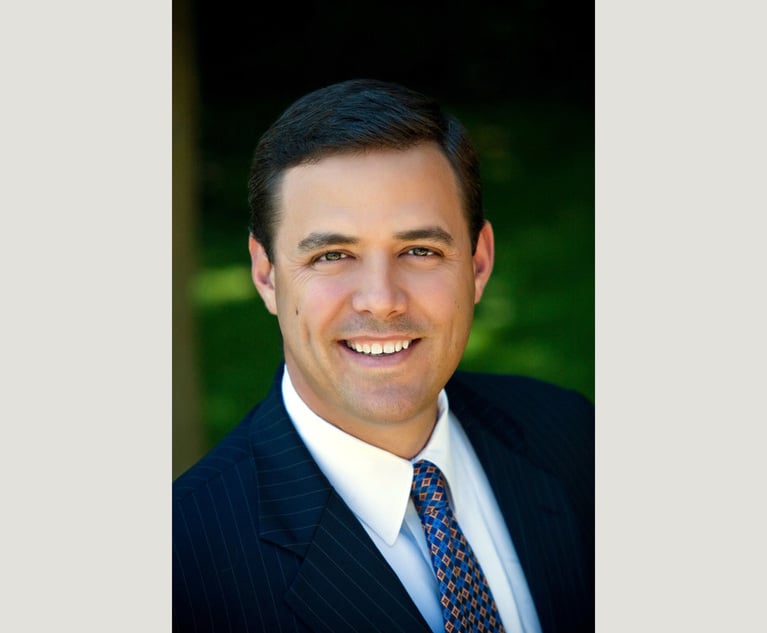What's Next for Digital Privacy? New Clashes Over the Fourth Amendment
USC law professor Orin Kerr says the Supreme Court's 2018 decision in Carpenter v. U.S. raises more questions than it answers.
March 07, 2019 at 04:36 PM
6 minute read
The following Q&A is an excerpt from Law.com's What's Next briefing, a weekly newsletter on the future of law. Click here to learn more.
It's been nearly a year since the U.S. Supreme Court ruled in Carpenter v. U.S, establishing murky rules to govern law enforcement access to the cell-site records that map the movements of anyone who carries a cellphone.
To Orin Kerr, a professor at USC Gould School of Law, the decision signals a new era in Fourth Amendment jurisprudence. We caught up with Kerr by email to ask about the pressures that digital technology places on the Fourth Amendment and where things go next.
➤ You write that the Supreme Court's decision in Carpenter v U.S. signals a “major break from the traditional understanding” of the Fourth Amendment. Can you explain why it's so impactful? After all, it's not the first case to deal with transformational technology and policing.
 Carpenter introduces a new way to think about the reasonable expectation of privacy test. Before Carpenter, Fourth Amendment rights were tied to places or things. The legal question was whether a person had a reasonable expectation of privacy in a place like a home, or in a thing like a car, that was invaded by the government's access of information from inside it. Under Carpenter, people have a reasonable expectation of privacy against certain levels of government power. If technology expands government power, the law adds constitutional protection to restore the level of privacy people had before the technological change. Now you can have Fourth Amendment rights in records that you didn't know existed, held by companies thousands of miles away, that might have information about you.
Carpenter introduces a new way to think about the reasonable expectation of privacy test. Before Carpenter, Fourth Amendment rights were tied to places or things. The legal question was whether a person had a reasonable expectation of privacy in a place like a home, or in a thing like a car, that was invaded by the government's access of information from inside it. Under Carpenter, people have a reasonable expectation of privacy against certain levels of government power. If technology expands government power, the law adds constitutional protection to restore the level of privacy people had before the technological change. Now you can have Fourth Amendment rights in records that you didn't know existed, held by companies thousands of miles away, that might have information about you.
➤ Does Carpenter provide a clear framework for lower courts to apply in evaluating other forms of digital records? What other kinds of digital age data do you expect will come up in future cases?
No, it doesn't. The law professor cliché is true: Carpenter raises more questions than it answers. First, we don't know what other records about us are protected. For example, what if the government collects IP addresses? Or tracks website visits? Or engages in public camera surveillance? Or obtains numbers dialed? Carpenter says that the Fourth Amendment now protects some kind of non-content third party records, but we don't know which ones. Second, we don't know when collection of those protected records is a search. Is only long-term surveillance covered? What if the government obtains only a single record at a single time? We just don't yet know if any surveillance is protected or if some kind of long-term surveillance is needed.
➤ Where does this leave the companies that are collecting user data? If they receive a subpoena, should they comply?
It leaves everyone with a lot of uncertainty. Companies with user data often can't know if the records they have collected are protected under the Fourth Amendment. Many of the records will also be protected by a federal statute called the Stored Communications Act, which has an immunity provision. As a result, companies shouldn't face legal liability for complying with that statute as long as the Fourth Amendment law remains uncertain. But some companies will want to err on the side of caution and demand warrants. At that point law enforcement has three choices. First, if they have probable cause, they can obtain warrants. Second, they can bring the company to court and try to enforce the lesser legal process. Third, they can give up trying to get that information.
➤ We recently reported on “reverse location search warrants” where a company like Google is asked to identify all mobile devices in the area of a crime scene at a particular time. What Fourth Amendment considerations are raised by this type of investigation tactic and does Carpenter provide any guidance?
Reverse location warrants raise a lot of legal issues. Carpenter doesn't so much provide guidance as add yet another hard question: Are the location coordinates protected by the Fourth Amendment at all? Before Carpenter, it was likely the case that the location records were not protected. They would have been considered metadata voluntarily communicated to the provider, and therefore outside Fourth Amendment protection. Carpenter leaves unclear whether these sorts of location records are still unprotected. It depends on how you read the Carpenter decision, I think, and in particular what you make of the Court's analysis of the voluntariness of generating records. If you take voluntary steps to generate records, then ordinarily that is on you and the records are not protected. Carpenter says that cell phone users don't make cell-site records voluntarily, however, because they have to use a cell phone to participate in modern life—and all cell phone use generates cell-site records. Creating such records is unavoidable unless you want to be a hermit, the Court reasons, so doing so is not voluntary in a “meaningful” sense. But is that also true for precise location coordinates stored in a Google account?
➤ What is the next digital Fourth Amendment issue that you expect to confront the Supreme Court?
There are two deep circuit splits ready for the Court's attention.
The first issue is how to apply the Fourth Amendment to searching computers that cross the border. The traditional rule is that the government does not need any cause to search and read paper documents crossing the border. The Eleventh Circuit has held that same rule applies to computer searches. But other lower courts have disagreed. The Ninth Circuit has required reasonable suspicion to conduct a forensic search of a computer crossing the border, and the Fourth Circuit has also said that some cause is needed.
The second circuit split considers how the Fourth Amendment applies when a private person brings someone else's computer to the government and claims to have seen evidence of crime in a particular file on the machine. The traditional rule is that the government can reenact the private search without a warrant but cannot exceed the private search. Lower courts are divided on how that rule applies. Can the police only look at that one file? Can they look at the entire computer? The question is, what is the unit courts should use to determine when a government search exceeded a private search?
Orin S. Kerr joined the faculty at USC Gould School of Law in 2018 as the Frances R. and John J. Duggan Distinguished Professor of Law. He specializes in criminal procedure and computer crime law. Stay tuned for Kerr's forthcoming book “A Digital Fourth Amendment.”
This content has been archived. It is available through our partners, LexisNexis® and Bloomberg Law.
To view this content, please continue to their sites.
Not a Lexis Subscriber?
Subscribe Now
Not a Bloomberg Law Subscriber?
Subscribe Now
NOT FOR REPRINT
© 2025 ALM Global, LLC, All Rights Reserved. Request academic re-use from www.copyright.com. All other uses, submit a request to [email protected]. For more information visit Asset & Logo Licensing.
You Might Like
View All
How I Made Office Managing Partner: 'Stay Focused on Building Strong Relationships,' Says Joseph Yaffe of Skadden

US Patent Innovators Can Look to International Trade Commission Enforcement for Protection, IP Lawyers Say

How the Deal Got Done: Sidley Austin and NWSL Angel City Football Club/Iger

How Uncertainty in College Athletics Compensation Could Drive Lawsuits in 2025
Trending Stories
- 1US DOJ Threatens to Prosecute Local Officials Who Don't Aid Immigration Enforcement
- 2Kirkland Is Entering a New Market. Will Its Rates Get a Warm Welcome?
- 3African Law Firm Investigated Over ‘AI-Generated’ Case References
- 4Gen AI and Associate Legal Writing: Davis Wright Tremaine's New Training Model
- 5Departing Attorneys Sue Their Former Law Firm
Who Got The Work
J. Brugh Lower of Gibbons has entered an appearance for industrial equipment supplier Devco Corporation in a pending trademark infringement lawsuit. The suit, accusing the defendant of selling knock-off Graco products, was filed Dec. 18 in New Jersey District Court by Rivkin Radler on behalf of Graco Inc. and Graco Minnesota. The case, assigned to U.S. District Judge Zahid N. Quraishi, is 3:24-cv-11294, Graco Inc. et al v. Devco Corporation.
Who Got The Work
Rebecca Maller-Stein and Kent A. Yalowitz of Arnold & Porter Kaye Scholer have entered their appearances for Hanaco Venture Capital and its executives, Lior Prosor and David Frankel, in a pending securities lawsuit. The action, filed on Dec. 24 in New York Southern District Court by Zell, Aron & Co. on behalf of Goldeneye Advisors, accuses the defendants of negligently and fraudulently managing the plaintiff's $1 million investment. The case, assigned to U.S. District Judge Vernon S. Broderick, is 1:24-cv-09918, Goldeneye Advisors, LLC v. Hanaco Venture Capital, Ltd. et al.
Who Got The Work
Attorneys from A&O Shearman has stepped in as defense counsel for Toronto-Dominion Bank and other defendants in a pending securities class action. The suit, filed Dec. 11 in New York Southern District Court by Bleichmar Fonti & Auld, accuses the defendants of concealing the bank's 'pervasive' deficiencies in regards to its compliance with the Bank Secrecy Act and the quality of its anti-money laundering controls. The case, assigned to U.S. District Judge Arun Subramanian, is 1:24-cv-09445, Gonzalez v. The Toronto-Dominion Bank et al.
Who Got The Work
Crown Castle International, a Pennsylvania company providing shared communications infrastructure, has turned to Luke D. Wolf of Gordon Rees Scully Mansukhani to fend off a pending breach-of-contract lawsuit. The court action, filed Nov. 25 in Michigan Eastern District Court by Hooper Hathaway PC on behalf of The Town Residences LLC, accuses Crown Castle of failing to transfer approximately $30,000 in utility payments from T-Mobile in breach of a roof-top lease and assignment agreement. The case, assigned to U.S. District Judge Susan K. Declercq, is 2:24-cv-13131, The Town Residences LLC v. T-Mobile US, Inc. et al.
Who Got The Work
Wilfred P. Coronato and Daniel M. Schwartz of McCarter & English have stepped in as defense counsel to Electrolux Home Products Inc. in a pending product liability lawsuit. The court action, filed Nov. 26 in New York Eastern District Court by Poulos Lopiccolo PC and Nagel Rice LLP on behalf of David Stern, alleges that the defendant's refrigerators’ drawers and shelving repeatedly break and fall apart within months after purchase. The case, assigned to U.S. District Judge Joan M. Azrack, is 2:24-cv-08204, Stern v. Electrolux Home Products, Inc.
Featured Firms
Law Offices of Gary Martin Hays & Associates, P.C.
(470) 294-1674
Law Offices of Mark E. Salomone
(857) 444-6468
Smith & Hassler
(713) 739-1250







